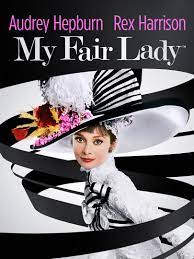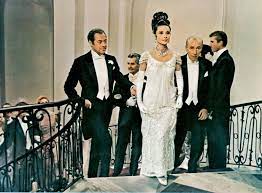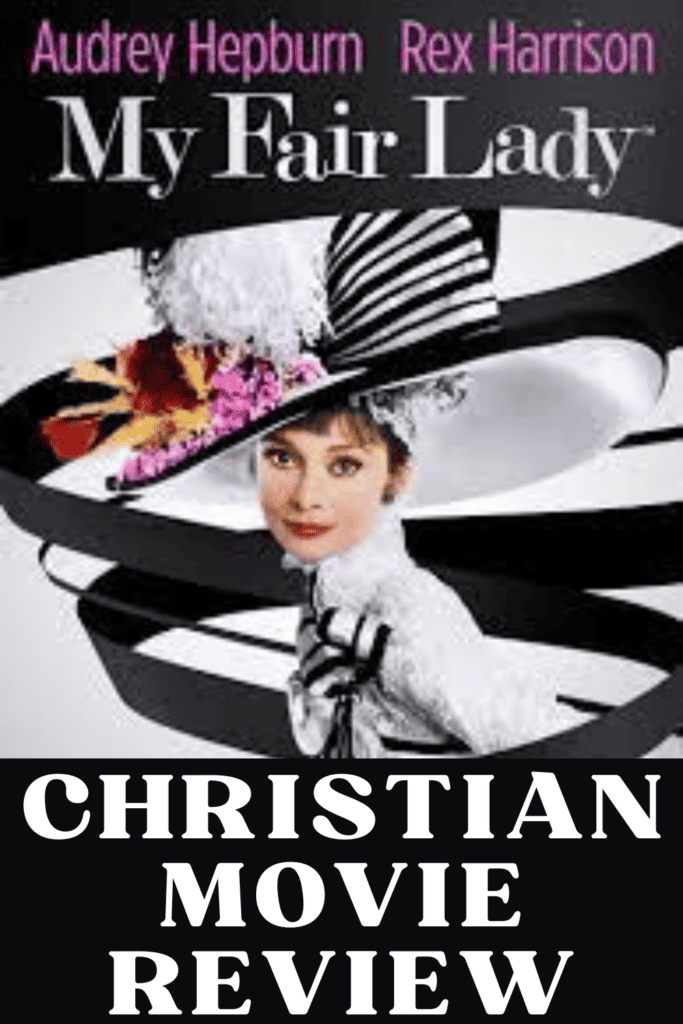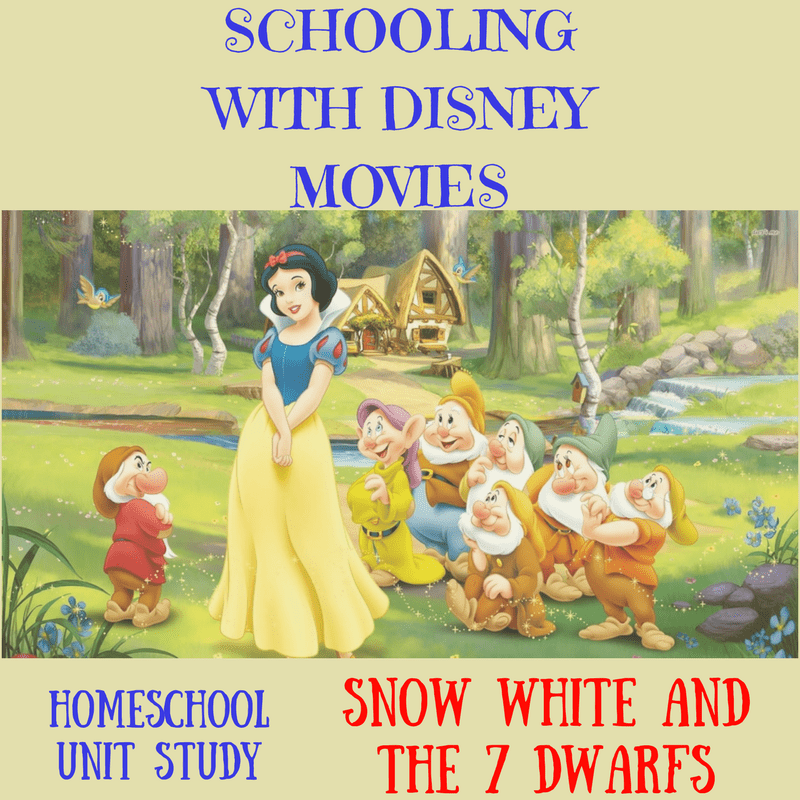Can People Change? The Power of Transformation
To celebrate the 60th anniversary of the release of My Fair Lady, a theatrical re-release is planned for the big screen. This year I turn sixty. However, I did not watch this film until 30 years after its release. I actually saw a play first, and then watch the movie. Two things shocked me. 1) This movie received a G rating by the MPAA. While this movie is pretty tame by today’s standards, there is still some foul language and drinking. 2) How much of the music I already knew, but didn’t know it was from My Fair Lady. In this Christian Movie Review of My Fair Lady, I give you the information you need before viewing this film with your children.
My Fair Lady delivers much more than I anticipated. It’s a tapestry rich with motifs of transformation, dedication, and modesty, set against the backdrop of early 20th-century England. Through Eliza Doolittle’s journey from a street flower seller to a dignified lady, the film makes a compelling case for the power of perseverance and personal growth. Remarkably, it manages to weave these themes into its narrative while remaining joyous and entertaining. This blend of profound life lessons with humor and a melodious musical score is what sets it apart.
Eliza’s sheer determination and Professor Higgins’ complex character dynamic offer much to ponder, especially when viewed through a Christian lens focusing on transformation, humility, and true character. Indeed, their stories resonate deeply with biblical principles of personal transformation and the intrinsic value found in every individual, regardless of their social standing.
Key Takeaways:
- Transformation and Growth: Eliza’s journey embodies the Christian virtues of transformation and perseverance, making her story both inspirational and relatable.
- Themes of Humility and Compassion: The film subtly conveys messages about humility and the importance of seeing beyond societal status, aligning well with Christian teachings on love and compassion.
- Enduring Appeal: With its blend of humor, memorable music, and spirited performances, My Fair Lady remains a classic that transcends generations, offering timeless lessons on character and dignity.

Synopsis of My Fair Lady
Professor Henry Higgins and colleague Col Pickering are well-educated, articulate gentlemen. Colonel Pickering comes to England to meet Higgins. After encountering a flower girl at Covent Garden who speaks with a thick cockney accent, the two phonetic experts make a bet. Higgins is sure he can take any girl with poor language skills and manners and transform her into a lady who can pass her off as a duchess at the ball in six months. Eliza Doolittle just wants to work at a flower shop instead of on the streets so she agrees to be Higgins protege.
What Parents Want to Know: Christian Review of My Fair Lady:
Language:
While the language is pretty tame by today’s standards, there is still a substantial use of d-mn. Additionally, phrases such as “Oh g-d,” “for g-d sakes,” “thank g-d,” and arse (cockney for a-s).
Violence:
While there is little physical violence, Eliza Doolittle throws slippers at Higgins. Additionally, in a scene where Hepburn is singing, she imagines the demise of Higgins – he is killed by a firing squad. Furthermore, there is plenty of threatened violence, for example, Higgins threatens to “wallop” Doolittle.
Other phrases:
“Should be taken out and hung for the cold-blooded murder of the English language.”
“I’ll take my belt off and give her a what for.”
“Give her a full lick with a strap.”
Eliza is forced to take a bath against her will. She screams and shrieks as a small child would, but it is supposed to be done in a comedic way.
Adult Content:
First, it should be noted that there is drinking of alcohol throughout the film. Additionally, Eliza’s father is often shown drunk or drinking. It appears he was never married to Eliza’s mom. On his last night before getting married, he is in a bar drinking, and women are sitting on his lap with dresses that reveal cleavage.
Eliza often says, “I’m a good girl,” implying that she does not sleep around. A few times Higgins calls her a hussy.
One person says, “Oh g-d, I wish I was dead.”
Today’s Standards
Prof. Higgins is clearly misogynistic as well as having an attitude of being better than others because of their social status.
Portrayal of Christian Values
My Fair Lady taught us the power of transformation. It showed us a woman transformed not just in speech but in spirit. This change wasn’t superficial; it dug deep, reflecting the Christian belief in the potential for renewal within us all. Eliza’s journey wasn’t easy. She stumbled, fought, and persevered. Isn’t that the heart of the Christian walk? We face trials, but through perseverance, we emerge stronger, our faith refined. Humility played its part too.
Both Eliza and Prof Higgins learn to see the world through the other’s eyes. This mirrors the Christian call to humility, to consider others more significant than ourselves.
Perhaps most striking is the celebration of inner beauty. Eliza’s true transformation wasn’t about accents or manners; it was her inner growth, her integrity, and compassion. Such qualities hold high value in Christian teachings, echoing the idea that what’s inside matters far more than outward appearances. My Fair Lady, with its witty dialogues and memorable melodies, thus serves as a beautiful canvas illustrating principles dear to the Christian heart—transformation, perseverance, humility, and the unfading beauty of a gentle and quiet spirit.

Positive Role Models and Character Dynamics
My Fair Lady shines a bright light on characters that embody resilience and humility. These figures, especially Eliza, break from societal expectations, displaying a steadfast courage that’s both inspiring and reflective of Christian values. They teach us the power of perseverance, showing that true character strength isn’t found in one’s social standing but in the genuine integrity of actions and words.
Compassion becomes a cornerstone, making it clear how essential empathy and kindness are in our interactions. This mirrors the Christian belief in loving one’s neighbor, a principle that Eliza and Higgins explore as they navigate their complex relationship. Through their journey, the film encourages viewers to look beyond surface-level judgments and appreciate the inherent worth in everyone. In a world where quick judgments are common, My Fair Lady offers a soothing reminder of the transformative power of treating others with dignity and respect.
But it’s not just about individual growth. The dynamics between characters serve as a powerful testament to the importance of understanding and mutual respect. By engaging with these stories, we can find compelling examples of how Christian teachings on compassion and integrity can manifest in real-world interactions, paving the way for deeper, more meaningful connections.
Colonel Pickering always treats Eliza with dignity and compassion. In fact, Eliza makes a speech to Higgins where she says that Pickering has always treated her as a duchess, even when she was a flower girl.
Exploring Social Class and Compassion
My Fair Lady reveals stark contrasts between the classes in early 20th-century England. This disparity prompts a deeper reflection on empathy and compassion from a Christian viewpoint. Eliza Doolittle’s journey from a lower-class flower girl to a refined lady exposes the prejudices and limitations imposed by society.
As Christians, we are called to love and serve others, regardless of their social standing. The film serves as a reminder that true character and worth are not determined by external circumstances. It emphasizes the importance of seeing beyond societal labels and extending kindness to all. In doing so, we embody the teachings of Christ, who showed unconditional love and compassion to everyone He encountered.
Thus, My Fair Lady entertains and challenges us to reconsider our attitudes towards social class. It prompts meaningful discussions about how we, as followers of Christ, can better reflect His love in our interactions with others, especially those who society might overlook or undervalue.
Addressing Content Concerns
My Fair Lady, a classic in the truest sense, does carry a few caveats that warrant a Christian family’s attention. Firstly, the film lightly touches on drinking in social settings, a portrayal reflecting its historical setting more than endorsing the act. Additionally, the dialogue includes mild language with a sparse use of terms like “a-s,” nestled within the witty repartees and delightful songs. In both scenarios, these elements serve as teaching moments rather than stumbling blocks. We watch and discuss with our children, pointing out that every piece of art reflects the era of its creation. This approach helps us distinguish between the film’s core message of transformation and perseverance and its historical context. Importantly, it opens the floor for deeper conversations about Christian values in a flawed world.
Positive Message for All Ages
My Fair Lady teaches us more than just the transformation of Eliza Dolittle. It encapsulates the essence of true beauty and love. This theme is deeply rooted in Christian values, showing that it’s not our outer appearance but our actions and character that define us. This film, through its engaging narrative and timeless characters, illustrates a good lesson on the importance of humility and inner beauty.
It’s this core message that makes My Fair Lady a beloved classic for all ages. By illustrating that true beauty comes from within, the film resonates with Christian teachings on love, compassion, and the significance of treating others with kindness and respect. This enduring appeal invites viewers to look beyond the surface and appreciate the depth of genuine affection and self-acceptance.
Impact of Music and Performances
The music in My Fair Lady isn’t just background noise. Every note and lyric speaks to the soul, echoing the film’s themes of transformation and redemption. The performances, especially Hepburn’s, wear sincerity and grace like a glove. They bring characters to life in a way that feels both real and aspirational. In a remarkable dance of composure and vulnerability, the actors showcase what it means to strive towards better versions of ourselves.
The classic elements of this musical—the costumes, the set designs, the melodious tunes—are more than just entertainment. They serve as vessels for transmitting values beloved in Christian teachings. Humility, perseverance in the face of adversity, and the beauty of internal transformation shine through. The musical numbers unite to craft a potent message: true change and real beauty originate from within, guided by faith and bolstered by sincere efforts.
Thus, engaging with this film becomes an experience that resonates on multiple levels. It’s not merely watching a story unfold; it’s a reflection on how grace, compassion, and integrity can transform lives. This movie, through its music and performances, delivers a timeless reminder of the values we cherish and aim to pass down.
Enriching Family Discussions
Watching My Fair Lady unlocks countless opportunities for family talks that merge entertainment with Christian values. Start with the vivid transformation of Eliza. It isn’t just about changing outwardly but a deeper internal growth that echoes the Christian ideal of rebirth and renewal. Then, explore the dynamics of humility and pride in the characters. They teach us that our worth isn’t in our status but in our actions and heart. Finally, delve into the idea of true love showcased in the film – it’s patient, kind, and sees beyond mere physical appearance, mirroring 1 Corinthians 13.
Christian Review of My Fair Lady – Viewing Recommendations
In closing, My Fair Lady teaches us the power of inner beauty and grace. These virtues shine brighter than any exterior elegance and hold true worth in the eyes of God. The journey of Eliza Doolittle mirrors our own path to discovering inner worth and the grace afforded to us through faith. This remarkable tale, rich in Christian values, leaves us reflecting on the transformative power of grace in our lives. It’s more than just a musical; it’s a call to recognize and cherish the beauty within us and in those around us, guided by divine grace.
While this film is suitable for children ages 8 and up, due to it’s length, I would caution you to wait until your children are a little older to view this film. Some children may also have a hard time with how harsh Eliza was treated by Higgins, and it is only with a understanding of woman’s rights during the time period of the film that one can understand the attitudes portrayed.
About the Movie:
Rating: G
Original Release Date: October 21, 1964
Runtime: 2 hours, 50 minutes
Genre: Musical/Comedy
Studio: Warner Bros.
Director: George Cukor
Screenplay by: Alan Jay Lerner
Based on Pygmalion by George Bernard Shaw
Produced by Jack L. Warner
Edited by: William H. Ziegler
Music by: Frederick Loewe
Distributed by: Warner Brothers
The Cast of My Fair Lady:
Eliza Doolittle played by Audrey Hepburn
Professor Henry Higgins played by Rex Harrison
Colonel Hugh Pickering played by Wilfrid Hyde-White
Alfred P Doolittle (Eliza’s father) played by Stanley Holloway
Mrs Higgins (Professor Higgin’s mother) played by Gladys Cooper
Freddy Eynsford-Hill played by Jeremy Brett
Mrs. Eynsford-Hill played by Isobel Elsom
Zoltan Karpathy played by Theodore Bikel
Mrs. Pearce (Housekeeper) played by Mona Washbourne
The Butler played by John Holland
The Music From My Fair Lady
Why Can’t the English Learn to Speak?
Wouldn’t It Be Loverly?
An Ordinary Man
With a Little Bit of Luck
Just You Wait
Servants Chorus
The Rain in Spain
I Could Have Danced All Night
Ascot Gavotte
On the Street Where You Live
Transylvanian March
Embassy Waltz
You Did It
Show Me
Get Me to the Church on Time
A Hymn to Him (Why Can’t A Woman Be More Like a Man?)
Without You
I’ve Grown Accustomed to Her Face
Facts About My Fair Lady
Audrey Hepburn:
While Audrey Hepburn is a fantastic actress, she wasn’t even nominated as the best female lead for her role in this film. Additionally, most of her singing was dubbed by Marni Nixon. Hepburn took voice lessons, but in the end, her singing voice was replaced in this classic musical. Marni Nixon who has a beautiful voice also dubbed Marilyn Monoroe’s high notes in Diamond’s Are a Girl’s Best Friend and Gentlemen Prefer Blondes. She dubbed Natalie Wood’s Maria in West Side Story (and kept it a secret from Wood).
Julie Andrews:
The film was adapted from a play by George Bernard Shaw. Eventually, it was a Broadway musical play with Julie Andrews played Eliza Doolittle in the play. In fact, Rex Harrison reprised his role as Henry Higgins. Furthermore, Julie Andrews was passed over for the film version because she was not a big name, and although Jay Lerner wanted Andrews in the film, the studio wanted a known actress. It makes you wonder if Andrews played Eliza Doolittle, would we have had Mary Poppins which was released in 1964 as well. Ironically, Julie Andrews proved that she was worthy of the big screen in her role as Mary!
Cary Grant:
The studio originally wanted Cary Grant to play Henry Higgins’s role. However, Grant turned down the role because he felt he couldn’t adequately play the role of a phonetics professor.
Other People Who Played in My Fair Lady:
Eliza Doolittle: Originally played by Julie Andrews. Then, played by Christine Andreas in the 1976 Broadway Revival. In the 2018 Broadway Revival, Lauren Ambrose played Doolittle. She has been been active in television and film. Laura Benanti has also played Eliza.
Henry Higgins: Originally played by Rex Harrison. Other notable names include Ian Richardson, Richard Chamberlain, Harry Hadden-Paton, and Danny Burstein.
Awards:
While My Fair Lady won the Academy Award for Best Picture, and Rex Harrison won for for Actor, Audrey Hepburn wasn’t even nominated. Ironically, Jule Andrews won the Academy Award for Best Actress for her role in Mary Poppins.


Reviewing movies for parents from a Christian perspective since 2005. Know Before You Go!
Christian Homeschooling mom – 30 years and counting
Autism Mom & Disney enthusiast
